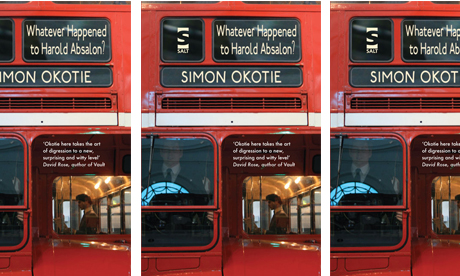Whatever Happened to Harold Absalon? – review

Whatever Happened to Harold Absalon? by Simon Okotie
Over-provision of detail can be the death of a good narrative, but in the case of Simon Okotie’s short and entertaining novel it’s the reverse.
Hackney resident Okotie drops us into the mind of Marguerite, a eccentric down- at-heel investigator who is looking into the mysterious disappearance of one Harold Absalon, the Mayor’s transport adviser.
Marguerite is an absurdly querulous fellow with more than a touch of the alien about him. A pedantic man, his ‘investigations’ begin with an obsessively detailed account of his following of Harold’s wife Isobel, and become increasingly digressive, with the denouement raising issues about Marguerite’s identity and involvement in Harold’s disappearance.
With its intentionally excessive descriptiveness, the book reads like a Private Eye satire of some ludicrously punctilious hack determined to recount every minute detail of a mundane scenario, and far from being tedious, it is very funny.
Marguerite spends chapter upon chapter describing the act of descending the staircase of a bus while going off on tangents and speculations, and becomes so bogged down in irrelevant details that he overlooks more pertinent matters. He somewhat brings to mind Meursault in Albert Camus’ existential masterwork The Outsider or perhaps a character from Kafka’s novel about a never-ending inquisition.
In an early chapter, while he is trailing Isobel in a hotel, we learn: “Marguerite could hear knives and forks on plates, and spoons on bowls, as soon as he rather breathlessly opened the door at the top of the stairwell, that is, on the eighth floor. He realised with contentment that there was a more or less direct correlation between spoon and bowl, at least between dessert/soup spoon and bowl, and teaspoon and cup/mug, or sometimes (in the case of a latte in a tall
glass with a handle) glass. He took delight in this correspondence.
The reason for it was simple enough – bowls and cups generally contained foodstuffs that tended more to liquid than to solid form and the spoon was the item of cutlery par excellence for transferring such foodstuffs between receptacle and mouth. The fork could be used for dessert – there was no denying that.
All he was asserting in this particular analytical flourish was that the spoon (or, more specifically, the dessert spoon and the dessert bowl, or the soup spoon and the soup bowl, or the tea spoon and the tea/coffee cup),went together; were natural partners.
It was another argument altogether to say that the dessert spoon always went with dessert, or that a knife and fork always went with the main course. Only a rhetorician of the very lowest orders would bring forward such a
proposition.”
And so, hilariously, it carries on in this Rumsfeldian ‘known knowns, known unknowns and unknown knowns’ kind of way.
Okotie, who conceived the idea for the book on his evening commute from work as a transport consultant in central London to Birkbeck, where he was studying philosophy, has a gift for seeing the everyday in new and original ways.
May this tale, published by independent publishers Salt, be a prelude to further fictional forays.
Whatever Happened to Harold Absalon? by Simon Okotie is published by Salt Publishing. ISBN: 9781907773341. RRP: £8.99
